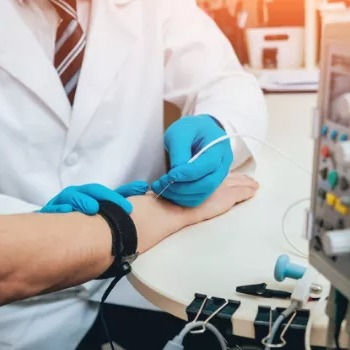[Pain Management NJ] Addressing The Issue Of Nerve Pain
- All of Pain

- Sep 13, 2023
- 4 min read
Updated: Jun 26, 2024

Nerve pain, also known as neuropathic pain, is a debilitating condition that affects millions of people worldwide. Unlike typical aches and pains, nerve pain originates in the nervous system itself, making it particularly challenging to treat.
Believe it or not, nerve pain comes from a wide range of conditions. If you've ever experienced nerve pain — you know how miserable it can be. Whether you've been injured and can't walk or have sciatica or other spine conditions, nerve pain is never fun. That's why our pain management NJ center can help!
This blog is about the complexities of nerve pain, its causes, symptoms, and the various approaches to address this issue, offering hope and guidance to those who suffer from it.
Understanding Nerve Pain
The nerves are responsible for the transmission of information from the body to the brain. Nerves are part of what is known as the peripheral nervous system and can be found in most parts of the body, including the arms and legs. Nerve pain arises when the nervous system malfunctions, sending faulty signals to the brain, even in the absence of any injury or external stimulus.
Causes of Nerve Pain

Nerve pain is a common symptom of many conditions and can be difficult to diagnose. It can occur anywhere in the body, including the lower back, arms, legs, feet, and hands. A number of underlying conditions and factors, including injury and disease, can cause nerve pain. Some common causes include:
Diabetes: Diabetic neuropathy is a common complication of diabetes, resulting from damage to the nerves due to high blood sugar levels.
Infections: Certain infections, such as shingles (herpes zoster), HIV/AIDS, and Lyme disease, can lead to nerve damage and subsequent pain.
Injuries: Trauma, accidents, or surgery may damage nerves directly, leading to chronic pain.
Autoimmune Disorders: Conditions like multiple sclerosis and lupus can trigger the immune system to attack the nervous system, causing nerve pain.
Neurological Conditions: Conditions like neuropathy, postherpetic neuralgia, and trigeminal neuralgia are primary culprits of nerve pain.
Toxins and Medications: Exposure to toxins or certain medications, such as chemotherapy drugs, can damage nerves and cause pain.
Understanding the factors that can exacerbate nerve pain is equally important to avoid unnecessary discomfort. Here are some things that can worsen nerve pain:
Poorly Managed Underlying Conditions: Failing to control conditions like diabetes or autoimmune disorders can lead to worsening nerve damage and increased pain.
Sedentary Lifestyle: Lack of physical activity can lead to muscle weakness and decreased circulation, potentially worsening nerve pain.
High Stress Levels: Stress can amplify pain perception, making nerve pain more intense.
Inadequate Pain Management: Not following prescribed treatments or medications can result in uncontrolled pain.
Smoking and Excessive Alcohol Consumption: Both smoking and excessive alcohol intake can exacerbate nerve damage and pain.
Symptoms of Nerve Pain

Nerve pain can manifest in various ways, and its symptoms can vary from person to person. It is characterized by a sharp, burning, stabbing, or electric shock-like sensation that can be persistent or intermittent. It may also radiate from the site of the injury to other areas of the body. The sensation can vary in intensity, from mildly discomforting to excruciating, significantly impacting one's quality of life.
Common signs include:
Burning or Tingling Sensation: A persistent sensation of heat or tingling often characterizes nerve pain.
Sharp or Shooting Pain: Many individuals experience sudden, intense, and stabbing pain.
Numbness or Weakness: Nerve damage may lead to numbness or muscle weakness in the affected area.
Increased Sensitivity: Some individuals become hypersensitive to touch, leading to pain with even the slightest pressure.
Pins and Needles: A sensation similar to pins and needles may be felt in the affected area.
Managing Nerve Pain
Managing and alleviating nerve pain is crucial for enhancing one's quality of life, and our pain management NJ center can provide specialized assistance in this regard. While there may not be a single, one-size-fits-all solution, our services offer various non-medication, non-invasive approaches to help individuals cope with this condition.
Nerve pain treatment may include:
Physical Therapy: Physical therapy can be beneficial for improving strength and mobility in areas affected by nerve pain.
Nerve Blocks: In some cases, nerve blocks involve injection into or around affected nerves to provide relief.
Lifestyle Changes: Adopting a healthy lifestyle, including managing underlying conditions like diabetes and quitting smoking, can slow the progression of nerve damage.

Alternative Therapies: Some individuals find relief through alternative therapies like acupuncture, chiropractic care, medical massage, and biofeedback.
Transcutaneous Electrical Nerve Stimulation (TENS): TENS units deliver low-level electrical currents to nerves, which can help alleviate pain.
Mind-Body Practices: Techniques such as mindfulness meditation and yoga can help individuals manage pain by promoting relaxation and reducing stress.
Nutritional Supplements: Certain supplements like alpha-lipoic acid and B vitamins may aid nerve health and reduce pain.
Relief From Nerve Pain
Nerve pain is a complex and challenging condition that can significantly impact a person's life. Our pain management NJ clinic offers specialized expertise in addressing nerve pain and can provide comprehensive care and treatment options. It is essential to consult with a healthcare professional to determine the underlying cause and develop a personalized treatment plan. By addressing the issue of nerve pain holistically, those who suffer from it can find hope and relief on their journey to recovery.

![[Bergen County Pain Management] Home Remedies for Elbow Pain and When to Visit a Pain Clinic](https://static.wixstatic.com/media/fabdf6_419ef635c35a4bbf80450281fc218e07~mv2.jpg/v1/fill/w_400,h_400,al_c,q_80,enc_avif,quality_auto/fabdf6_419ef635c35a4bbf80450281fc218e07~mv2.jpg)
![[New Jersey Pain Management] 10 Hidden Causes of Chronic Neck Pain Most People Ignore](https://static.wixstatic.com/media/fabdf6_3b9d71f8835e4fb4b060f53d9d1f1e84~mv2.jpg/v1/fill/w_980,h_515,al_c,q_85,usm_0.66_1.00_0.01,enc_avif,quality_auto/fabdf6_3b9d71f8835e4fb4b060f53d9d1f1e84~mv2.jpg)
![[Englewood Cliffs Pain Management] Understanding Chronic Pain: Why It Is More Than Physical Discomfort](https://static.wixstatic.com/media/fabdf6_08f1e99758e840b89034db094944e236~mv2.jpg/v1/fill/w_980,h_515,al_c,q_85,usm_0.66_1.00_0.01,enc_avif,quality_auto/fabdf6_08f1e99758e840b89034db094944e236~mv2.jpg)
Comments